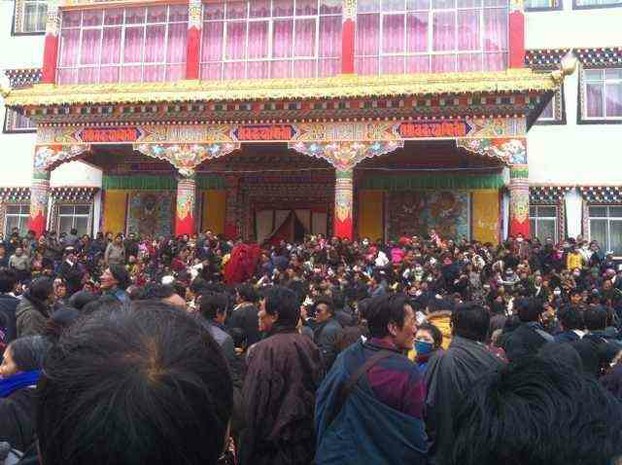Chinese officials expel unregistered monks from Tibetan monastery
| Publisher | Radio Free Asia |
| Publication Date | 12 June 2015 |
| Cite as | Radio Free Asia, Chinese officials expel unregistered monks from Tibetan monastery, 12 June 2015, available at: https://www.refworld.org/docid/5589505e15.html [accessed 21 May 2023] |
| Disclaimer | This is not a UNHCR publication. UNHCR is not responsible for, nor does it necessarily endorse, its content. Any views expressed are solely those of the author or publisher and do not necessarily reflect those of UNHCR, the United Nations or its Member States. |
2015-06-12
 Tibetans hold a mass prayer gathering at Zilkar monastery, Feb. 25, 2013. Photo courtesy of Lobsang Sangye
Tibetans hold a mass prayer gathering at Zilkar monastery, Feb. 25, 2013. Photo courtesy of Lobsang Sangye
Chinese authorities have further tightened restrictions at a key monastery in a Tibetan-populated county of Qinghai province, strictly limiting the number of monks allowed to study there and pursuing suspects thought to have been involved in activities challenging Beijing's rule, sources said.
Government officials are now expelling monks not officially enrolled at Nyatso Zilkar monastery in the Yulshul (in Chinese, Yushu) prefecture's Tridu (Chenduo) county, a local source told RFA's Tibetan Service.
"The Zilkar monks themselves have also been told they cannot go to other monasteries to study," RFA's source said, speaking on condition of anonymity.
"Only those who are registered within the approved quota of monks assigned to Zilkar will be allowed to remain there," the source said.
Detained, released
Meanwhile, Chinese police this week detained and then released a Zilkar monk they had sought on still-unknown charges, the source said.
"On June 10, a group of Chinese police arrived at the monastery at around 2 p.m., detained a monk named Tsultrim Woeser, and took him away," the source said.
"He was held in custody for two days and then released, but he was told not to return to the monastery and was driven some distance away," he said.
No reasons were given for Woeser's detention, RFA's source said, adding that contacts in the area have described him as a "simple and devoted monk."
"But local Tibetans who know him believe he may have come to the attention of police because of his use of social media, and because of his previous travels to [Tibet's regional capital] Lhasa and in the Amdo region," the source said.
Chinese authorities have stepped up curbs on communications in Tibetan-populated regions where social media are sometimes used to transmit politically sensitive information, including news and images of local protests.
Second monk sought
On June 11, police again arrived at the monastery, looking for a monk who had come from Sichuan to study there, the source said.
"But they left when monks told them the monk had already left Zilkar and was no longer living there."
Nyatso Zilkar, where monks in recent years have led protest marches and held prayer gatherings to honor self-immolation protesters, has frequently been targeted by Chinese authorities for heightened security measures.
On February 8, 2012, about 400 monks from Nyatso Zilkar monastery in Tridu county launched a seven-mile "solidarity" march but were stopped by security forces halfway at a bridge, angering hundreds of local residents who then joined the demonstration.
Sporadic demonstrations challenging Chinese rule have continued in Tibetan-populated areas of China since widespread protests swept the region in 2008, with 141 Tibetans to date setting themselves ablaze to oppose Beijing's rule and call for the Dalai Lama's return.
Reported by Kunsang Tenzin for RFA's Tibetan Service. Translated by Karma Dorjee. Written in English by Richard Finney.
Link to original story on RFA website
